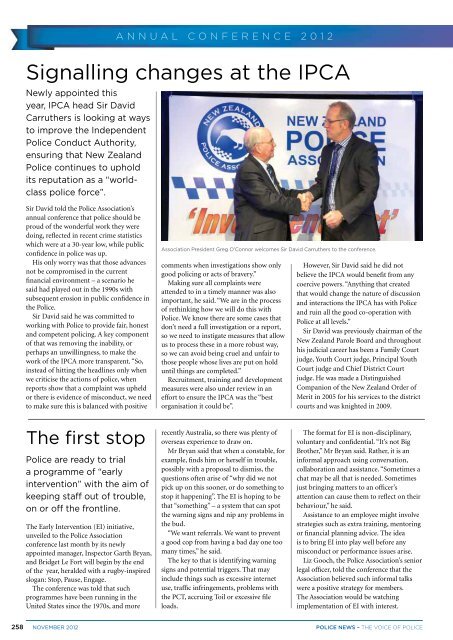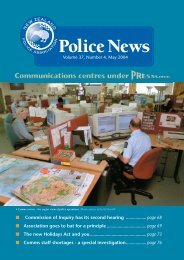2012-11 - New Zealand Police Association
2012-11 - New Zealand Police Association
2012-11 - New Zealand Police Association
Create successful ePaper yourself
Turn your PDF publications into a flip-book with our unique Google optimized e-Paper software.
ANNUAL CONFERENCE <strong>2012</strong>Signalling changes at the IPCA<strong>New</strong>ly appointed thisyear, IPCA head Sir DavidCarruthers is looking at waysto improve the Independent<strong>Police</strong> Conduct Authority,ensuring that <strong>New</strong> <strong>Zealand</strong><strong>Police</strong> continues to upholdits reputation as a “worldclasspolice force”.Sir David told the <strong>Police</strong> <strong>Association</strong>’sannual conference that police should beproud of the wonderful work they weredoing, reflected in recent crime statisticswhich were at a 30-year low, while publicconfidence in police was up.His only worry was that those advancesnot be compromised in the currentfinancial environment – a scenario hesaid had played out in the 1990s withsubsequent erosion in public confidence inthe <strong>Police</strong>.Sir David said he was committed toworking with <strong>Police</strong> to provide fair, honestand competent policing. A key componentof that was removing the inability, orperhaps an unwillingness, to make thework of the IPCA more transparent. “So,instead of hitting the headlines only whenwe criticise the actions of police, whenreports show that a complaint was upheldor there is evidence of misconduct, we needto make sure this is balanced with positive<strong>Association</strong> President Greg O’Connor welcomes Sir David Carruthers to the conference.comments when investigations show onlygood policing or acts of bravery.”Making sure all complaints wereattended to in a timely manner was alsoimportant, he said. “We are in the processof rethinking how we will do this with<strong>Police</strong>. We know there are some cases thatdon’t need a full investigation or a report,so we need to instigate measures that allowus to process these in a more robust way,so we can avoid being cruel and unfair tothose people whose lives are put on holduntil things are completed.”Recruitment, training and developmentmeasures were also under review in aneffort to ensure the IPCA was the “bestorganisation it could be”.However, Sir David said he did notbelieve the IPCA would benefit from anycoercive powers. “Anything that createdthat would change the nature of discussionand interactions the IPCA has with <strong>Police</strong>and ruin all the good co-operation with<strong>Police</strong> at all levels.”Sir David was previously chairman of the<strong>New</strong> <strong>Zealand</strong> Parole Board and throughouthis judicial career has been a Family Courtjudge, Youth Court judge, Principal YouthCourt judge and Chief District Courtjudge. He was made a DistinguishedCompanion of the <strong>New</strong> <strong>Zealand</strong> Order ofMerit in 2005 for his services to the districtcourts and was knighted in 2009.The first stop<strong>Police</strong> are ready to triala programme of “earlyintervention” with the aim ofkeeping staff out of trouble,on or off the frontline.The Early Intervention (EI) initiative,unveiled to the <strong>Police</strong> <strong>Association</strong>conference last month by its newlyappointed manager, Inspector Garth Bryan,and Bridget Le Fort will begin by the endof the year, heralded with a rugby-inspiredslogan: Stop, Pause, Engage.The conference was told that suchprogrammes have been running in theUnited States since the 1970s, and morerecently Australia, so there was plenty ofoverseas experience to draw on.Mr Bryan said that when a constable, forexample, finds him or herself in trouble,possibly with a proposal to dismiss, thequestions often arise of “why did we notpick up on this sooner, or do something tostop it happening”. The EI is hoping to bethat “something” – a system that can spotthe warning signs and nip any problems inthe bud.“We want referrals. We want to preventa good cop from having a bad day one toomany times,” he said.The key to that is identifying warningsigns and potential triggers. That mayinclude things such as excessive internetuse, traffic infringements, problems withthe PCT, accruing Toil or excessive fileloads.The format for EI is non-disciplinary,voluntary and confidential. “It’s not BigBrother,” Mr Bryan said. Rather, it is aninformal approach using conversation,collaboration and assistance. “Sometimes achat may be all that is needed. Sometimesjust bringing matters to an officer’sattention can cause them to reflect on theirbehaviour,” he said.Assistance to an employee might involvestrategies such as extra training, mentoringor financial planning advice. The ideais to bring EI into play well before anymisconduct or performance issues arise.Liz Gooch, the <strong>Police</strong> <strong>Association</strong>’s seniorlegal officer, told the conference that the<strong>Association</strong> believed such informal talkswere a positive strategy for members.The <strong>Association</strong> would be watchingimplementation of EI with interest.258 november <strong>2012</strong>police news – the voice of police

















